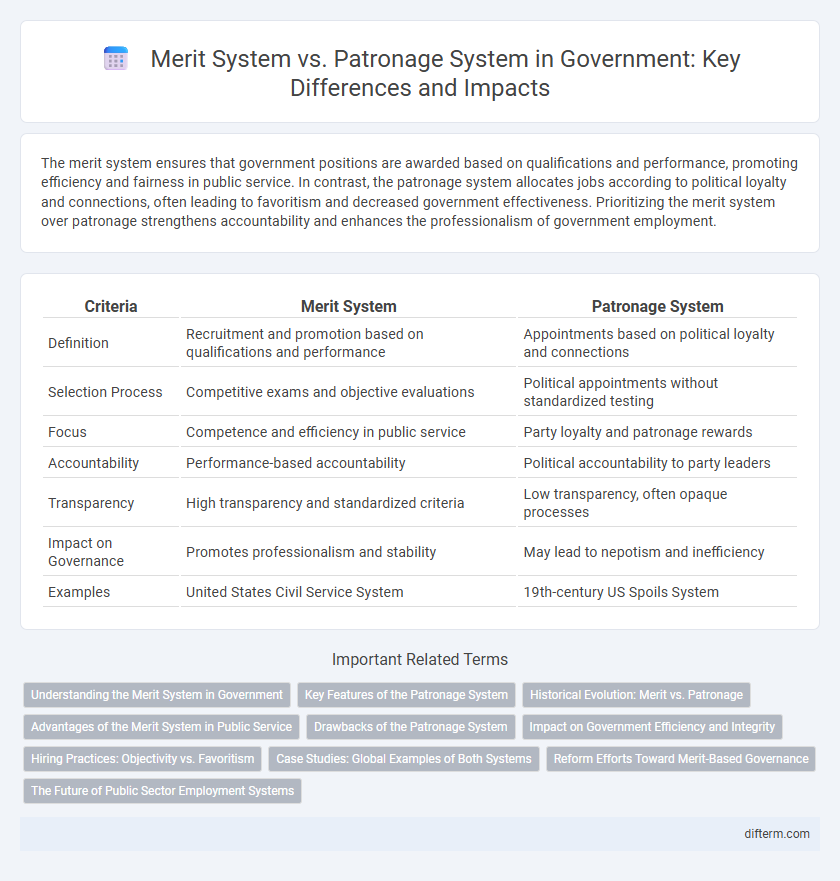The merit system ensures that government positions are awarded based on qualifications and performance, promoting efficiency and fairness in public service. In contrast, the patronage system allocates jobs according to political loyalty and connections, often leading to favoritism and decreased government effectiveness. Prioritizing the merit system over patronage strengthens accountability and enhances the professionalism of government employment.
Table of Comparison
| Criteria | Merit System | Patronage System |
|---|---|---|
| Definition | Recruitment and promotion based on qualifications and performance | Appointments based on political loyalty and connections |
| Selection Process | Competitive exams and objective evaluations | Political appointments without standardized testing |
| Focus | Competence and efficiency in public service | Party loyalty and patronage rewards |
| Accountability | Performance-based accountability | Political accountability to party leaders |
| Transparency | High transparency and standardized criteria | Low transparency, often opaque processes |
| Impact on Governance | Promotes professionalism and stability | May lead to nepotism and inefficiency |
| Examples | United States Civil Service System | 19th-century US Spoils System |
Understanding the Merit System in Government
The merit system in government ensures that employee recruitment, promotion, and retention are based on qualifications, skills, and performance rather than political connections. It promotes fairness, enhances public service efficiency, and reduces corruption by relying on competitive exams and objective criteria. This system strengthens transparency and accountability in government operations by fostering a professional and competent workforce.
Key Features of the Patronage System
The patronage system in government is characterized by the appointment of officials based on political loyalty and connections rather than qualifications or merit. Key features include frequent turnover of staff following elections, widespread political favoritism, and the use of government jobs as rewards for campaign support. This system often leads to inefficiency and corruption, undermining the professionalism and stability of public administration.
Historical Evolution: Merit vs. Patronage
The historical evolution of government employment reveals a significant shift from the patronage system, prevalent in the 19th century, to the merit system established by the Pendleton Civil Service Reform Act of 1883. The patronage system, or spoils system, rewarded political supporters with jobs, often leading to inefficiency and corruption. In contrast, the merit system introduced competitive exams and qualifications, promoting professionalism and accountability in public service.
Advantages of the Merit System in Public Service
The merit system in public service ensures that government positions are awarded based on qualifications and competence, promoting efficiency and professionalism across agencies. It reduces corruption and favoritism by emphasizing objective criteria such as education, experience, and performance. This system fosters employee motivation and accountability, leading to improved public trust and better service delivery.
Drawbacks of the Patronage System
The patronage system often leads to inefficiency in government operations due to appointments based on political loyalty rather than qualifications. This practice increases the risk of corruption and favoritism, undermining public trust and accountability. Consequently, the patronage system can hinder merit-based advancement and the overall effectiveness of public administration.
Impact on Government Efficiency and Integrity
The merit system enhances government efficiency and integrity by promoting qualified candidates based on skills and performance, reducing political bias and corruption. Patronage systems often undermine operational effectiveness by prioritizing loyalty over competence, leading to mismanagement and increased susceptibility to unethical practices. Implementing merit-based hiring fosters transparency and accountability, critical for sustaining public trust and optimal government functionality.
Hiring Practices: Objectivity vs. Favoritism
The merit system in government hiring emphasizes objectivity by selecting candidates based on qualifications, skills, and performance assessments, ensuring fairness and competency. In contrast, the patronage system prioritizes favoritism, appointing individuals based on political connections or loyalty rather than merit. This distinction significantly impacts the efficiency, transparency, and public trust in government institutions.
Case Studies: Global Examples of Both Systems
Singapore's merit system exemplifies a highly efficient public service model, where recruitment and promotion are based on qualifications and performance, leading to improved governance and public trust. In contrast, the patronage system in some Latin American countries often results in political appointments tied to loyalty rather than competence, causing inefficiency and corruption. Comparative studies show merit-based countries like Canada consistently achieve higher government accountability and citizen satisfaction compared to patronage-dominant nations.
Reform Efforts Toward Merit-Based Governance
Reform efforts toward merit-based governance emphasize the establishment of competitive exams and transparent hiring processes to ensure qualified candidates fill government positions. These initiatives aim to reduce patronage by minimizing political influence and favoritism in public employment decisions. Implementing merit systems enhances accountability and promotes efficiency within government agencies.
The Future of Public Sector Employment Systems
The future of public sector employment systems increasingly favors merit-based approaches over patronage systems to enhance transparency, efficiency, and equity in hiring practices. Integrating advanced data analytics and AI-driven assessments ensures a fair evaluation of candidates' skills and qualifications, reducing biases inherent in patronage networks. Emphasizing meritocracy supports the development of a competent, accountable workforce capable of addressing complex governance challenges and fostering public trust.
merit system vs patronage system Infographic

 difterm.com
difterm.com